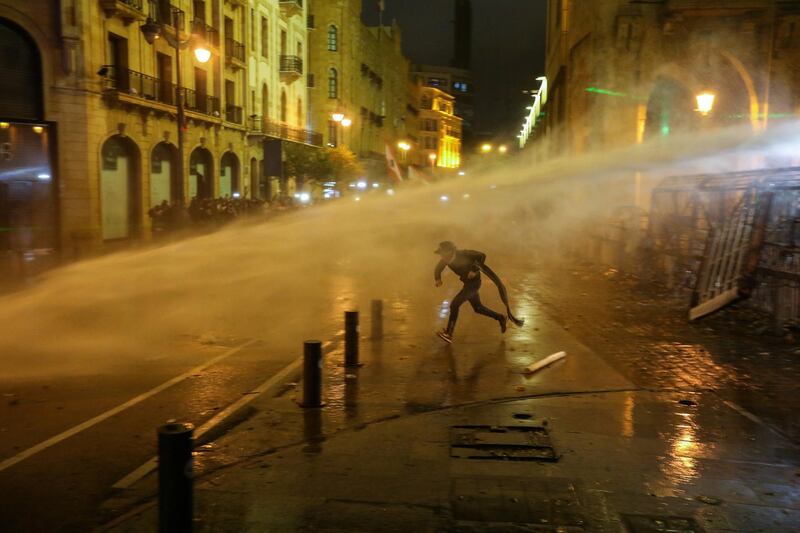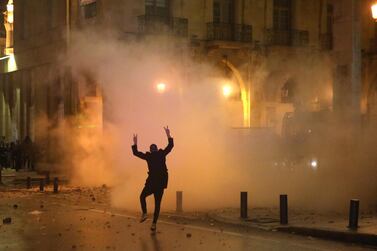Lebanon's under-fire President on Monday met top security officials to discuss rare protest violence at the weekend that injured hundreds.
They were trying to agree on a plan to deter violent groups on whom "security services have detailed information" while protecting property and peaceful protesters, sources at the meeting told Reuters.
Lebanon's political elite was reacting after a weekend of violent confrontation in which security forces used water cannon and rubber bullets to disperse protesters.
The demonstrators have also attacked public and private property in Beirut, mostly banks that have imposed informal capital controls, limiting the withdrawal of dollars and foreign transfers.
Caretaker Prime Minister Saad Al Hariri said on Monday that the country needed to quickly form a new government to stop a cycle of collapse and worsening economic and security conditions.
How does a state gains respect from the people? By deploying the army with RPGs in the middle of a protest in its capital of course.#LebanonProtests #Beirut #لبنان_ينتقض pic.twitter.com/qNYtg225HN
— Georges Haddad (@Georges__Haddad) January 19, 2020
Politicians have failed to agree on a government or an economic rescue plan since the unrest prompted Mr Hariri to quit as prime minister on October 29.
The crisis has shattered confidence in banks and raised investor concerns about its ability to repay steep foreign debt.
Lebanon's financial strains have caused the currency to plummet, forced up prices and led to banks putting strict limits on withdrawing and transferring dollars, further angering hard-hit Lebanese depositors.
The country's consumer protection association said there had been "a rise in prices for the first time in Lebanon's history at rates exceeding 40 per cent over the past three months", a state news agency NNA reported.
Mr Hariri tweeted that the "continuation of the caretaker government is not the solution, so let's stop wasting time and have the government bear the responsibility".
Last month, little-known former minister Hassan Diab was designated prime minister with the backing of the Iran-backed militant group, Hezbollah, and its allies but a deal on a Cabinet has yet to be announced.
"Our government resigned to transition to a new government dealing with popular changes, but obstruction has continued for 90 days and the country is moving towards the unknown," Mr Hariri said.
Security forces on Sunday night detained an American freelance journalist on suspicion of broadcasting live footage to an Israeli newspaper.
Lebanon and Israel are at a state of war and ban their citizens from visiting or contacting the other country.
Lebanon's State Security department said overnight that the US citizen was at the scene of the protest near the Parliament building, from which someone was broadcasting live to the Israeli paper.
State Prosecutor Ghassan Oueidat referred the journalist to military intelligence for questioning and investigation, the department said.
The area outside Parliament was packed with journalists, many of them correspondents for international news agencies.
International coverage of the three months of protests in Lebanon has picked up in the past two days as the violence worsened.







